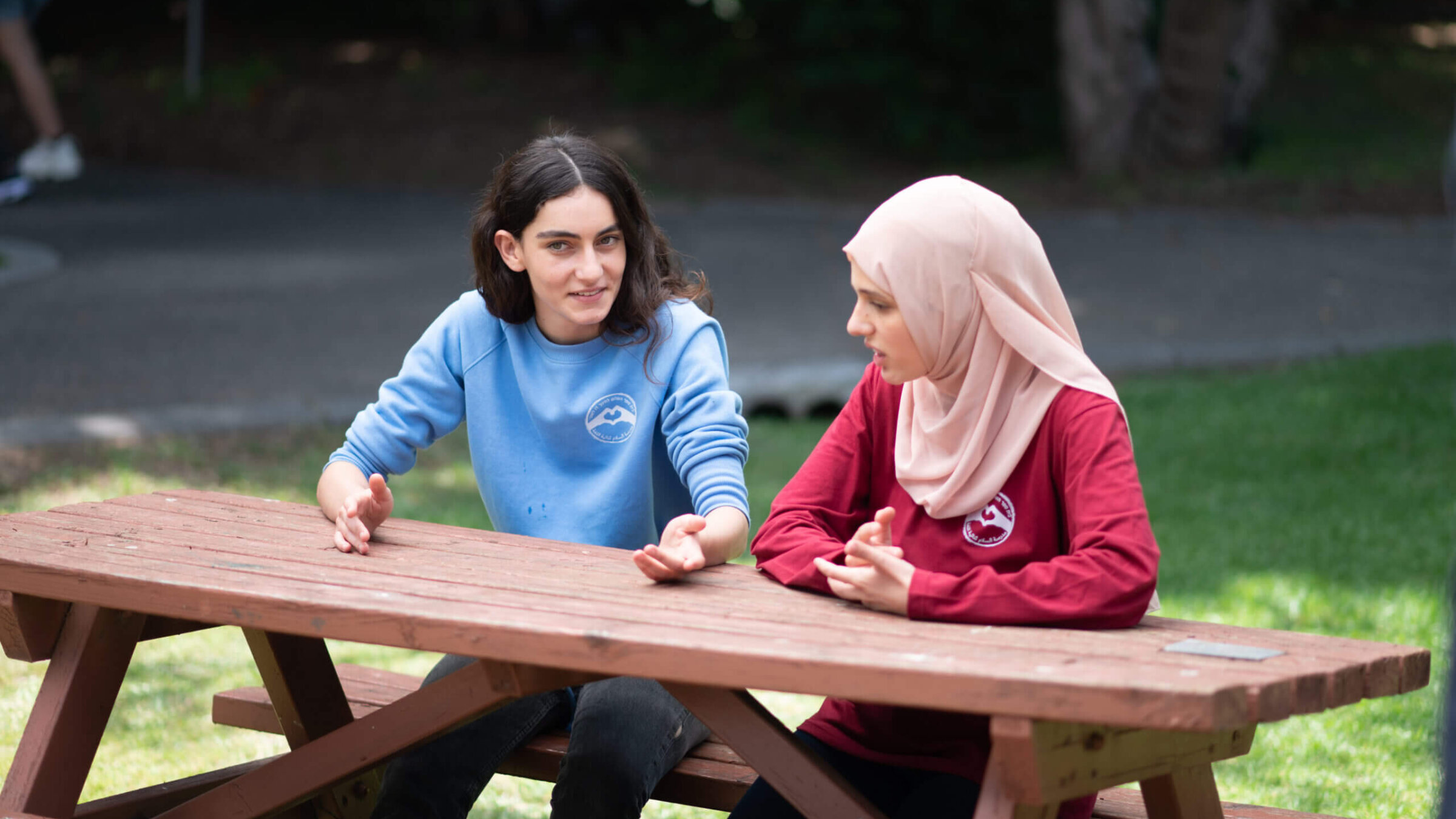This Arab-Israeli high school comedy is the TV show about the conflict we all need right now
Sayed Kashua’s newest TV show is a realist, yet hopeful — and funny — approach to the conflict

Shira, a Jewish student, and Lubna, an Arab student, are good friends. Courtesy of Go2Films
It’s hard to feel hopeful about a peaceful future in the Middle East right now. But a little optimism may lie in an unexpected place: a high school TV show.
Madrasa, created by Arab-Israeli TV writer Sayed Kashua, follows the Arab and Jewish students at a bilingual school in Jerusalem, based on the real-world Hand in Hand, a bilingual program with six schools across Israel. The show was originally slated to screen at the Other Israel Film Festival this past November in Manhattan, but the festival was postponed; a new date has not yet been announced.
That’s a shame, because Madrasa offers an approachable way to understand the conflict through small, real, moments, sidestepping the high-level government and political maelstrom to focus on everyday life. In many ways, it’s a typical high school dramedy: teenage romance, parental conflict, troublemakers and nerds. But through the students’ relationships — with each other, their teachers, their families and their neighbors — it deftly takes on the complex politics of life in the most contested city in Israel without feeling, for the most part, heavy-handed.
Kashua’s best known previous show, the semi-autobiographical comedy Arab Labor, did a similar balancing act. Its main character, an Arab-Israeli journalist, squabbled with his traditional family in their Arab village, while also struggling with his desire to integrate seamlessly into Israeli society to achieve professional success. (Madrasa, too, likely draws from Kashua’s experience; his daughter attended the Jerusalem Hand in Hand school.)
It’s notable that Kashua’s shows air on Israeli television — Arab Labor ran three seasons on Keshet, and Madrasa is shown on Kan’s educational channel — despite the fact that they are largely in Arabic. They depict a side of Israeli society many Israelis don’t engage with. Arabs often appear in Israeli media as either the butt of a joke or as terrorists, like in the well-known TV show Fauda. But Kashua’s characters are fully-developed, relatable and deeply normal people. He doesn’t omit the racism of Israeli society, but it also doesn’t define his characters. The students in Madrasa care just as much about a student’s Crocs as his ethnicity.
The show largely focuses on two students, Shira and Khaled, a Jewish girl and an Arab boy, who begin to fall for each other, and the ensuing conflict — between their families, both of whom want to be accepting but struggle with the political reality, and between their own inability to always understand each other.
But other characters get their own episodes. Omer or Omar, depending on language — he has a Jewish mother and an Arab father — gets scouted for a notoriously racist Israeli soccer team. Iman, an Arab teacher at the school, loses her apartment because she’s friends with Jews but can’t find an apartment in a Jewish area because she’s Arab. And, in one of the funniest episodes, the nerdy Manar hosts a German exchange student who desperately wants to atone for the Holocaust, but can’t seem to grok that the family she’s been placed with is Arab.
Other episodes poke fun at the well-meaning liberal Israelis who wish for peace but have no idea how to get there, like one in which Jewish parents, desperate for their kid to make an Arab friend at school, go to great lengths to figure out the ethnicity of an ambiguously-named kid.
Though Madrasa is tongue-in-cheek, it still takes on the harsh reality of the conflict; the students both joke and openly struggle with the way their identities have been pitted against each other. Lubna, who is the only religious student, either Jewish or Arab, and wears a hijab, says her neighbors nevertheless call her “the Jew” for attending the bilingual school. The school’s Jewish teacher, Eitan, tries to hide the fact that he’s been called for reserve duty, ashamed of the realities of being a Jewish citizen of Israel no matter how much he believes in coexistence.
Sometimes, the show’s depiction of the conflict can feel a bit naive; the tribulations are resolved too easily. When the class has a lesson on the contentious 1947 U.N. Partition Plan, in which the British proposed borders for an Israeli state and a Palestinian one, the students argue heatedly — but, when the teachers have the students do a role play, assigning the Arabs to argue for the Jewish side and vice versa, they instantaneously see each other’s side. If only it were so easy.
But, for the most part, Madrasa engenders real hope, especially through its smallest moments. Just watching the students speak to each other in both Hebrew and Arabic, mixing colloquialisms and slang from each, as though it’s the most normal thing in the world is poignant — though right now, it feels impossibly hopeful.























